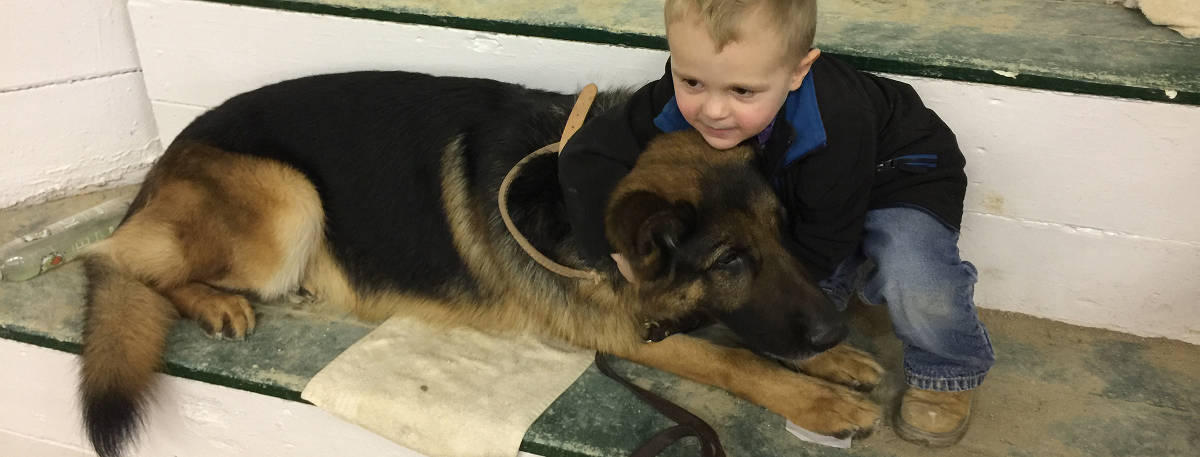A German Shepherd dog, or simply GSD for short, is a popular dog breed that cuts a regal figure. Desirable traits that have made them #2 out of 197 in the AKC annual list of most popular dogs are their loyalty, friendliness and high intelligence. Size is often an important trait to consider if you are thinking about adopting a dog, too, and German Shepherds are a medium to large size breed. Due to their larger size, you may be wondering if they are suitable as a family dog, especially if you have small children. The good news is that a GSD can make a wonderful companion in the right home, and what follows can help you decide if they are the right dog for yours.
Which Bloodline is Best for Families?
There are three main bloodlines of German Shepherd dogs: American, East and West. West German Shepherds are better known as Sieger or show line dogs. West German Shepherds are the best choice for families, as they offer the best in both companionship and protection. In fact, they are often known as “protection you can hug.” The West German Bloodline makes amazing family companion dogs, and they are used regularly as Therapy and Service dogs . Also, the breeding of West German Shepherds is highly regulated, which can be an issue among the American bloodline. Because of this, breeders of “Westies” are held to a very high standard.
It’s really important that you get a dog from a reputable breeder – otherwise you risk encountering all kinds of problems.
Are They Good with Children?
GSD males are 23 to 26 inches tall at their withers, which is the ridge between the shoulder blades and the tallest part of their body. Additionally, they weigh between 66 to 88 pounds. Females are 21 to 24 inches tall at the withers and weigh between 49 to 71 pounds. German Shepherds can and do, get along very well with children. However, one that has not been socialized and trained properly from an early age could show aggression to members of the household, regardless of that person’s age. Proper training is a must if your dog is going to be around children of any age. It’s also imperative that they get plenty of exercise – many hours per day, or they risk exhibiting signs of misbehaviour.
Are They Good With Toddlers?
On a whole, GSDs are typically good around children of all ages, due to their calm and patient nature. German Shepherds and toddlers do not always mix too well, and even one with the sweetest disposition can accidentally harm a small child due to their size alone. Due to the larger size and weight of the males, Regis Regal only adopts out females to families with small children. Again, proper training is a must here, and is something we can provide on an ongoing basis.
Will they Guard or Bite?
German Shepherds can guard or bite if they are not properly trained, and we utilize a German-based positive approach to train ours. Common behavioral reasons that German Shepherds guard and bite are listed below.
1. Improper Breeding
Although a GSD is a highly intelligent working class type of canine, temperament must be bred into them; it is the only behavioral aspect they can’t pick up with training. It is impossible for a novice to look at a young puppy and know what it will turn out like as an adult. When looking for your next pup, you should request to see at least three generations. If the breeder can’t provide this proof, you may as well buy a GSD puppy unseen, which is a very scary thought.
2. Bite Inhibition
A German Shepherd pup who was never taught proper bite inhibition can cause significant damage as it gets older. With bite inhibition training, a puppy is taught how to use its mouth gently. Training starts with the mother and its littermates and lasts until the puppy reaches around 8 weeks of age, which is why you should never remove a puppy from its brothers, sisters and mother before 7 weeks. Bite inhibition training continues with its handlers until the puppy reaches 4-5 months.
3. Resource Guarding
Dogs can show aggression when they are resource guarding. This is when a dog growls or snaps at a person or pet that comes near their food or toys. As an aside, German Shepherds can sometimes be aggressive with other dogs, so the decision to introduce them to your home is something to consider strongly if you already own dogs. Resource guarding can also happen when someone tries to remove the GSD from its resting place. Well-meaning people that remove the dog’s food or toys in an attempt to “train” them not to food guard merely reinforce this undesirable trait.
4. Lack of Socialization
Socialization of your GSD is one of the most important parts of helping them become a wonderful companion to the kids in your home. Exposing them to new surroundings, people, and other dogs is an essential part of their development, but it is even more critical if your newest family member will be around children.
Choosing the right breeder for your next family dog
Our dogs truly have the best temperament, so they make excellent Companion Dogs for families with kids. We encourage family and canine socialization and positive reinforcement in everything we do. We believe in educating each dog to its fullest capabilities, for whichever service it will be used for. We educate every dog as an individual, offering extensive obedience training, and we don’t utilize ‘mass training’ methods.
